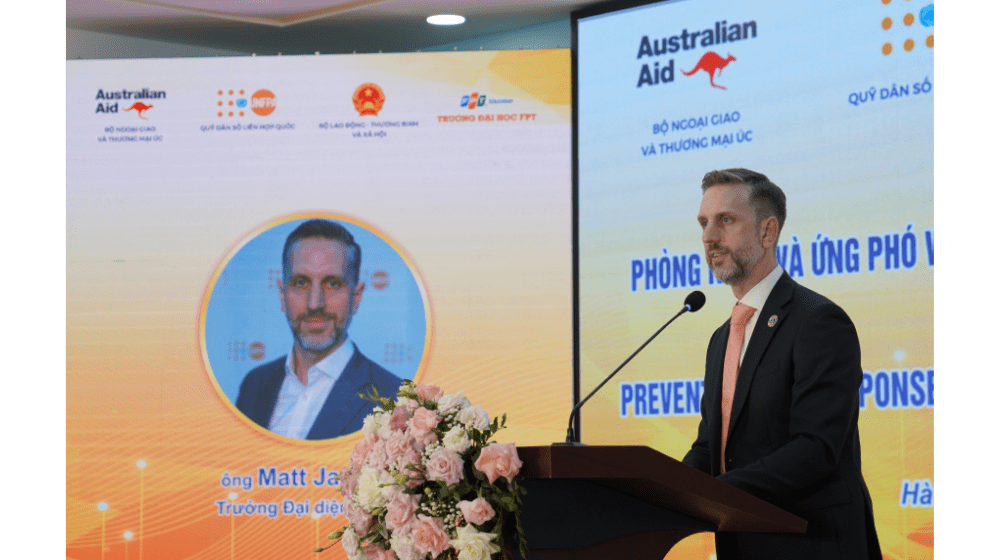- Excellency Mdm Nguyen Thi Ha, the Vice Minister of Labour, Invalids and Social Affairs;
- Mr. Ta Ngoc Cau, Vice Director of the FPT University Hanoi;
- Senior officials from MOLISA;
- Professors, lecturers and students of the FPT University Hanoi;
- Representatives of local media
Good afternoon, everyone.
Standing in front of such a young and dynamic audience is amazing. You are Gen-Z: confident users and sometimes creative developers of technology. Your thoughts, ideas, aspirations and visions for a better world are what we really want to hear today, so thank you for participating in this important discussion.
I particularly look forward to hearing how you think we prevent and respond to technology-facilitated gender-based violence.
First of all, allow me to express my sincere thanks to Vice Minister H.E. Nguyen Thi Ha and the Ministry of Labour, Invalids and Social Affairs for organising this event. Excellency, your presence here today underlines the Government’s strong commitment to ending gender-based violence be it in the real world or virtual world.
I would also like to thank FPT University for making this dialogue happen. And the Government of Australia for their financial support to the project to “Eliminate violence against women and Children in Viet Nam”. I hope that FPT University continues to inspire students to unite to end any form of violence, stigma or discrimination, including through use of technology.
Digitalisation is driving structural change in how we communicate, work, learn, produce and consume. Technological innovation and digitalisation are opening a window of opportunities for sustainable development, at a time when many aspects of human life are being radically transformed. Technology has the potential to foster economic growth; and to expand access to education, information, and knowledge.
As a result, our lives become ever more managed through the use of technology and much of our time is spent online. Does that sound familiar?
We are living a digital revolution. This is positive in so many ways, such as in supporting the fight against gender-based violence. We can now reach survivors in the most precarious and remote locations. However, technology and online spaces are increasingly being misused to facilitate hate and violence against women and girls.
Globally, 85% of women have reported witnessing online violence, and nearly 40% have experienced it personally and the problem is growing every. UNFPA research reveals increasing misogynistic and violent language on social media around the world. Technology-facilitated GBV is pervasive, perpetual, anonymous and covert.
It is mostly committed by intimate partners and is designed to demean, control and ultimately silence women and girls.
Digital violence is often highly sexualized and takes many forms, including cyber harassment, hate speech, doxing (revealing private information such as an address or identity), and image-based abuse (such as sharing explicit images without consent including up-skirting, deepfakes, and cyber stalking).
Having your image taken, manipulated and shared without permission is a violation of privacy, dignity, and autonomy and can be a devastating experience. The feelings of fear, anxiety, humiliation, loss of self-esteem, and sense of powerlessness are real and enduring.
And women, girls, ethnic minorities, LGBTQ+, persons with disabilities and other marginalised communities are more likely to have their images abused online with the intention to demean, control and ultimately silence.
Therefore, addressing technology–facilitated gender-based violence, as a growing area of critical concern, is no longer negotiable. Ensuring that everyone can freely participate online, without fear of violence and abuse is vital.
Technology and online platforms should serve as tools for accelerating gender equality and the empowerment of women.
For this reason, UNFPA, the United Nations sexual and reproductive health agency, has launched the “bodyright” campaign, the first ‘copyright’ for the human body. This new ‘copyright’ mark demands protection from online gender-based violence. In other words, bodyright is about the right to own your body online.
The bodyright advocacy campaign support people to raise their voices and push digital companies, social platforms, content-sharing sites and policymakers to take virtual violence and online abuse as seriously as they do copyright infringements.
In Viet Nam, UNFPA will run the bodyright campaign on our social media in late November as part of the global 16 days of activism to end gender-based violence, and Viet Nam’s National Action Month on gender equality to be held by the Ministry of Labour, Invalids and Social Affairs from 15 November to 15 December. I call on all of you to join our campaign to claim your bodyright and to inspire others to join.
Digital violence is violence.
All spaces, whether virtual or real world, should be free from violence against women and girls.
Together, we can claim our bodyright bring an end to online abuse. Thank you.


